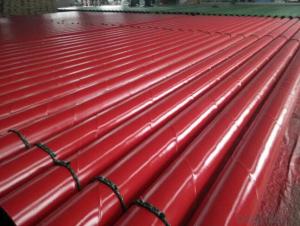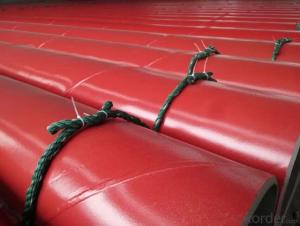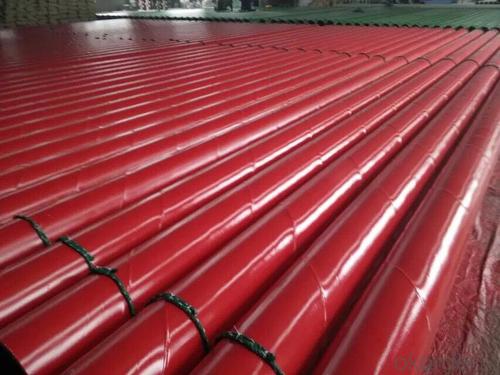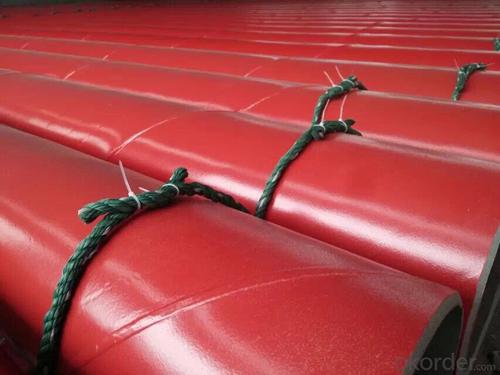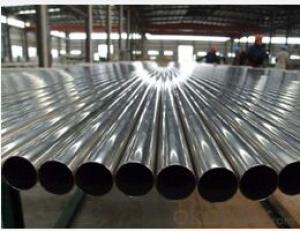seamless and welded steel pipe external coating
- Loading Port:
- China Main Port
- Payment Terms:
- TT OR LC
- Min Order Qty:
- -
- Supply Capability:
- -
OKorder Service Pledge
OKorder Financial Service
You Might Also Like
Specifications
water pipeline inner-layer tape
1 Butyl rubber as adhesive
2. SGS test report and DVGW certificate
3. corrosion protection
water pipeline inner-layer tape
State-of-the-Art Pipeline Protection for All Climates & Environments
System description:
WATER PIPELINE Inner -layer tape also be called pipe wrap anti-corrosion tape, polyethylene wrap tape.
water pipeline Inner-layer tapeT100 is engineered to assure a high bond to the primed pipe surface with excellent conformability characteristics, aggressive adhesive for corrosion protection and repair of main line coatings.
Inner-layer tapeT100 series is cold applied tape coating system for corrosion protection of Oil, Gas, Petrochemical, and Waste Waterburied pipeline, pipe can be buried, also can be underground ,overhead ,onshore and offshore .
Structure of water pipeline inner wrap tape
The specification of the tape consists of two layers, adhesive layer and film backing
Adhesive: butyl rubber
Film backing: Special blend of stabilized polyethylene
Features & Benefits
Provides a permanent bond to the primed steel pipes surface and provides protection against chemical electrolytic corrosion for underground pipelines.
long term corrosion protection
Worldwide reference lists. Established in-ground history
High chemical resistance under service temperature.
Outstanding electric property and permanent adhesion.
Cold applied, No release liner. Makes installation fast and easy.
Complies with EN-DIN 30672 and AWWAC-214 international standards and also ASTM standards.
Be used for water pipeline corrosion protection
System Properties
Type | T138 | T 150 | T165 | T180 | T 250 | T265 | T280 | |
Thickness | 15mil 0.38mm | 20mil 0.508mm | 25mil 0.635mm | 30mil 0.762mm | 20mil 0.508mm | 25mil 0.635mm | 30mil 0.762mm | |
Backing | 9mil 0.229mm | 9mil 0.241mm | 10mil 0.25mm | 10mil 0.25mm | 15mil 0.38mm | 20mil 0.508mm | 25mil 0635mm | |
Adhesive | 6mil 0.152mm | 11mil 0.279mm | 15mil 0.381mm | 20mil 0.508mm | 5mil 0.127mm | 5mil 0.127mm | 5mil 0.127mm | |
When used for ductile iron pipes inner layer 980-20 or 980-25 and outer layer 955-20 or 955-25 are recommended. | ||||||||
Elongation | ³300% | ³400% | ||||||
Tensile Strength | 55 N/cm | 70 N/cm | ||||||
Color | Black | White | ||||||
Peel Adhesion to Primed Pipe | 33 N/cm | |||||||
Dielectric Strength | 30 KV | |||||||
Dielectric Breakdown | 26 KV/mm | |||||||
Cathodic Disbandment | 0.24 in radius 6.4 mm | |||||||
Water Vapor Transmission Rate | < 0.1% | |||||||
Volume Resistivity | 2.5 x 1015 ohm.cm | |||||||
Impact resistance | 5.5Nm | |||||||
Penetration Resistance | <15% | |||||||
Performance | AWWA C-209,ASTM D 1000,EN 12068 | |||||||
Order information
Length | 100ft(30 M),200ft(60 M),400ft(120 M),800ft(240 M) |
Width | 2’’(50mm),4’’(100mm),6’’(150mm),17’(450mm),32’’(800mm) |
- Q: What are the factors that affect the lifespan of steel pipes in different environments?
- The factors that affect the lifespan of steel pipes in different environments include exposure to corrosive substances, temperature fluctuations, water quality, and mechanical stress.
- Q: What are the different methods of pipe bending for steel pipes?
- Some of the common methods of pipe bending for steel pipes include rotary draw bending, induction bending, and hot bending.
- Q: What are the different joining methods for steel pipes?
- The different joining methods for steel pipes include welding, threaded connections, flanges, and grooved connections.
- Q: Can steel pipes be used for transporting gases and liquids?
- Yes, steel pipes can be used for transporting both gases and liquids. Steel pipes are highly durable, corrosion-resistant, and have excellent strength, making them suitable for various applications, including oil and gas pipelines, water supply systems, and industrial processes.
- Q: Can steel pipes be used for piling?
- Yes, steel pipes can be used for piling. Steel pipes are commonly used in piling applications due to their strength, durability, and versatility. They are able to withstand the load and pressure of the soil and provide a stable foundation for structures. Steel pipes used for piling are typically driven into the ground using specialized equipment, ensuring they are securely positioned. Additionally, steel pipes can be easily cut and welded to the required length, making them suitable for various piling projects.
- Q: Can steel pipes be used for underground air supply systems?
- Yes, steel pipes can be used for underground air supply systems. Steel pipes are often used in underground applications due to their strength, durability, and resistance to external factors such as corrosion and impact. They can withstand the pressure and temperature requirements of air supply systems and can be easily installed underground. Additionally, steel pipes have a long lifespan, making them a cost-effective choice for underground air supply systems. However, it is important to consider factors such as soil conditions, potential for corrosion, and local regulations when selecting the appropriate steel pipes for the specific underground air supply system.
- Q: How are steel pipes repaired in case of damage?
- Steel pipes are repaired in case of damage through various methods such as welding, patching, or replacing the damaged section. The appropriate repair technique depends on the type and extent of the damage to ensure the structural integrity and functionality of the pipe.
- Q: Can steel pipes be used for heat exchangers?
- Yes, steel pipes can be used for heat exchangers. Steel is a commonly used material for heat exchangers due to its high thermal conductivity and durability. It can efficiently transfer heat between two fluids, making it suitable for various industrial applications.
- Q: What industries typically use steel pipes?
- Steel pipes are widely used in various industries due to their durability, strength, and versatility. Some of the industries that typically utilize steel pipes include: 1. Construction: Steel pipes are extensively used in the construction industry for various applications such as structural support, plumbing, and underground piping systems. They are commonly used in commercial buildings, residential structures, bridges, and tunnels. 2. Oil and gas: The oil and gas industry heavily relies on steel pipes for drilling, transporting, and distributing oil and gas. Steel pipes are used in offshore drilling rigs, oil refineries, natural gas processing plants, and pipelines to ensure the safe and efficient transport of these valuable resources. 3. Water and wastewater: Steel pipes play a crucial role in providing clean water supply and managing wastewater. They are used in water treatment plants, desalination facilities, and municipal water distribution systems. Steel pipes are also utilized for sewage and stormwater management. 4. Manufacturing: Various manufacturing industries employ steel pipes for specific applications. For instance, automobile manufacturers use steel pipes in exhaust systems, fuel lines, and hydraulic systems. Steel pipes are also used in the manufacturing of machinery, equipment, and appliances. 5. Mining: The mining industry requires strong and durable materials for its operations. Steel pipes are used in mining applications such as conveying materials, ventilation systems, and underground infrastructure. They are particularly useful in transporting minerals, ores, and other mining byproducts. 6. Energy and power: Steel pipes are extensively used in power generation facilities, including thermal power plants, nuclear power plants, and renewable energy installations. They are utilized in steam pipelines, cooling systems, and heat exchangers. Steel pipes are also employed in the construction of transmission lines for electricity distribution. 7. Infrastructure and transportation: Steel pipes are essential for infrastructure development and transportation systems. They are used in the construction of roads, bridges, railways, and airports. Steel pipes are also utilized in the transportation of fluids and gases, such as in pipelines for natural gas or petroleum products. Overall, the versatility and reliability of steel pipes make them indispensable in a wide range of industries, contributing to various aspects of our modern infrastructure and daily lives.
- Q: How are steel pipes specified in engineering drawings?
- Steel pipes are typically specified in engineering drawings by indicating their diameter, wall thickness, material grade, and length. Additional specifications may include the type of connection or joining method, surface finish requirements, and any specific standards or codes that need to be followed.
Send your message to us
seamless and welded steel pipe external coating
- Loading Port:
- China Main Port
- Payment Terms:
- TT OR LC
- Min Order Qty:
- -
- Supply Capability:
- -
OKorder Service Pledge
OKorder Financial Service
Similar products
Hot products
Hot Searches
Related keywords
